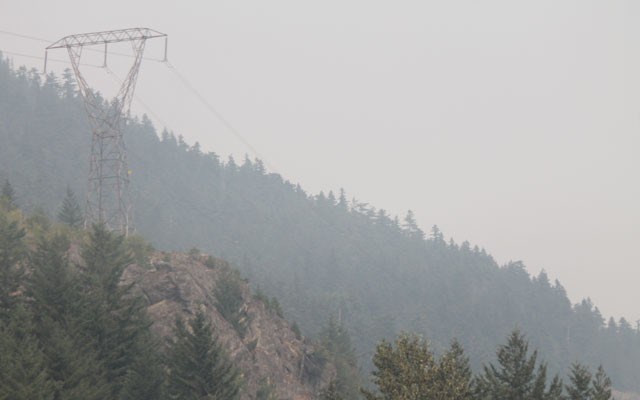No surprise to anyone who's been outdoors lately — Whistler's air quality is bad, and it's not clear when it will get better.
Current readings peg the resort's air quality at a 9 — just below a Very High Health Risk.
The smoke is coming from fires burning in B.C.'s Interior.
"The phenomenon that's bringing this smoke towards the coast is these outflow winds," said Kevin Skrepnek, chief fire information officer with the BC Wildfire Service.
"So typically the wind flows from the ocean inland, (and) what we've been having with this weather pattern that we're in is the wind instead is coming from inland through the valleys and then back out to the ocean, and it's bringing the smoke and high temperatures with it."
As for how long it will last, it's hard to say, Skrepnek added.
"I can't really give you a firm answer. It's going to be entirely dependent on how the weather kind of unfolds over the next few days," he said.
Stay up to date with the latest air quality readings here: www.env.gov.bc.ca/epd/bcairquality/readings/find-stations-map.html
The combination of smoke and heat can be tough for many people, particularly young children, the elderly, or those with chronic heart and lung conditions, said deputy provincial health officer Dr. Bonnie Henry.
"We want people to be aware that these conditions may need them to slow down and take some extra precautions, and we really encourage people to check on each other, particularly elderly family members or neighbours who may not be able to get out, who may not have access to cooler areas or clean air," Henry said.
"Know where to find shelter if you need it, keep hydrated... making sure that people who have chronic conditions have your mediations with you, make sure you take them when you're outside, have a plan for what to do if your rescue medications aren't working and know where to go for help."
When it comes to outdoor activity, Henry said that for most healthy people it comes down to personal choice.
"Some people will be more affected by it than others, and so we say use some common sense," she said.
"If you're not feeling well, if you're short of breath, if it's irritating, if it makes you cough, then take your physical activity indoors, and for people who have chronic conditions like asthma or other heart and lung conditions, maybe look at doing your physical activity indoors rather than outdoors, and take extra precautions with the smoke that we're seeing."
B.C.'s state of emergency was formally extended through August 18 on Friday, and will continue to apply to the entire province.
As of Friday there were 123 fires burning across B.C., with nine new blazes started on Thursday.
Since April 1 there have been 872 fires burning an estimated 509,000 hectares of land and costing the BC Wildfire Service an estimated $211.7 million.
"Our efforts remain focused on protecting public safety and keeping our highway routes open," Skrepnek said.
"We have over 3,800 personnel working under the BC Wildfire Service as of today, that includes firefighters and support staff, over 800 personnel from out of province, as well as nearly 1,400 contractors from the forest industry and 209 aircraft currently supporting our ground operations."
Locally, all campfires and smoking in parks have been banned. The Resort Municipality of Whistler (RMOW) said firefighters are keeping an eye on 16 locations throughout the community that are popular for campfires. Bylaw officers will also be patrolling areas known for smoking throughout the weekend. A fine for discarding a cigarette during an extreme fire rating is $300, with a possible maximum penalty of $10,000.
At this time, Whistler's parks and trails remain open at the discretion of the Whistler Fire Rescue Service (WFRS).
"The WFRS position is to keep parks and trails open to the general public so that they are in a position to report any sign of wildfire," read an RMOW release on Friday.
The WFRS currently has crews on standby to respond to possible fires in a timely fashion.
Report all fires in Whistler boundaries by calling 911, and outside of municipal boundaries by calling the BC Wildfire Service at 1-800-663-5555 (*5555 from a cell phone).
You can track smoke patterns at www.firesmoke.ca
Head to www.bcwildfire.ca for up-to-date info on the wildfire situation in the province.
For more details on the RMOW's Comprehensive Emergency Management Plan — which includes its recently updated Evacuation Plan — visit www.whistler.ca/how-municipality-prepares-emergencies.




